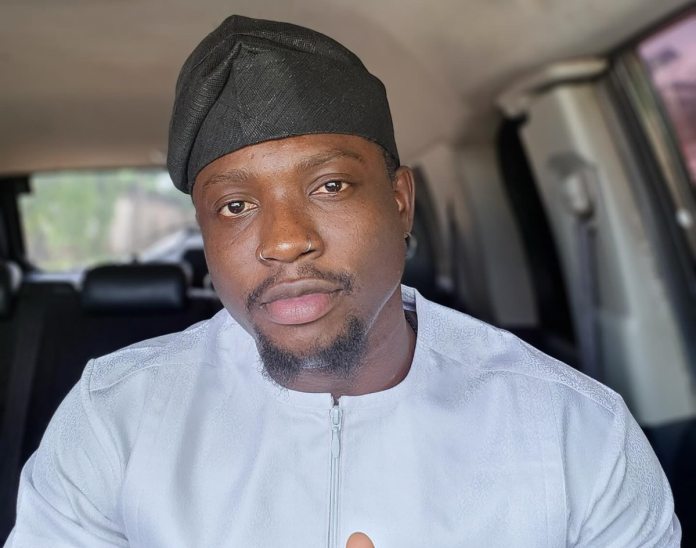INTRO: “He has become one of Nigeria’s most polarizing digital figures, lauded as a whistleblower, lambasted as an arrogant provocateur. Meet VeryDarkMan: influencer, activist, and a chronic disruptor of the status quo. His real name is Vincent Otse, and in just a few years, he has carved out an unmistakable presence in the chaotic terrain of Nigerian social media. To some, he is a digital David slinging stones at Goliaths of corruption and celebrity hypocrisy. To others, he is a fire-starter hiding behind activism—fueling outrage, branding slander as justice.”
Vincent Otse’s story begins in Kaduna, born on April 8, 1994, and raised in modest surroundings. He studied Business Administration at the University of Lagos but made an unexpected leap into digital activism in 2022. That year, under the moniker VeryDarkMan, he began broadcasting his frustrations with the Nigerian system. His voice was raw, unscripted, and relentless. He questioned the moral hypocrisy of the powerful, took aim at flamboyant pastors, and called out celebrities he believed were deceiving their followers.
At first, many dismissed him as just another loud voice online. But something about his style; brazen, unapologetic, often profane, gripped a generation raised on skepticism. Within months, he gained a cult following. His influence soared in 2023, with major endorsements from public figures like Davido and even a nomination at the Silverbird Awards. His content wasn’t just viral—it felt necessary.
But Vincent wasn’t content with just going viral. He decided to act. In 2024, he launched an NGO aimed at helping the underprivileged. In less than 24 hours, he raised ₦33 million from Nigerians at home and in the diaspora. Then came a ₦100 million donation from Don Jazzy. For a time, it seemed he had cracked the code, digitally driven activism that was transparent, impactful, and people-powered. He positioned himself as a tech-savvy Robin Hood, and his audience, especially Nigerian youth, were all in.
Yet, as the spotlight grew brighter, so did the shadows. Behind the righteous indignation and philanthropic bravado, there emerged a pattern of unchecked claims, viral accusations, and a seeming disregard for accountability. His platform, once a mirror for justice, began to resemble a stage for judgment. In September 2024, popular crossdresser Bobrisky slammed him with a ₦1 billion lawsuit over an AI-generated audio clip that allegedly defamed them and senior Nigerian officials. No solid evidence was produced, but the damage was done. Gospel singer Mercy Chinwo followed with a ₦1.1 billion defamation suit after VeryDarkMan accused her of financial exploitation through her ministry. The courts intervened. A Lagos High Court ordered him to take down posts falsely implicating renowned human rights lawyer Femi Falana and his son, the musician Falz. He refused.
The lawsuits weren’t just piling up, they were revealing a deeper flaw in his approach. Critics described him as erratic, combative, and obsessed with proving moral superiority. Pulse Nigeria published an editorial branding him a “huge ego trip,” warning that his repeated disregard for court rulings posed a real danger to civic discourse. Activism, they argued, should not be an excuse for anarchy.
Still, Vincent remained unfazed. In his own words, he sees himself as a necessary voice in a corrupt nation; Nigeria’s moral internet police. But the line between conviction and recklessness grows thinner with every video, every lawsuit, every accusation he throws without hard proof. What started as a movement to hold power accountable is slowly evolving into a personal empire built on unverified claims, inflammatory language, and a refusal to apologize or retract.
There is no doubt that his presence has shifted the online culture of accountability in Nigeria. Politicians are more cautious. Celebrities are being held to higher standards. The once-silent youth now speak in hashtags and comment threads. But at what cost? Can we allow social media outrage to replace structured legal processes? Are we trading truth for virality?
Vincent Otse is a mirror of his time—a product of disillusionment, digital access, and a nation’s desperation for truth. But he is also a warning: that the same platforms used to challenge injustice can, if left unchecked, become tools of harm, defamation, and unearned power.
His story is still unfolding. For some, he remains a necessary disruption, a loud, flawed, but vital figure in a society too used to silence. For others, he represents the rise of a dangerous trend: where likes and retweets legitimize accusations, and where personal arrogance is masked as activism.
EPILOGUE
VeryDarkMan stands at a crossroads—pulse of a new generation, but shadowed by lawsuits and public distrust. His influence is both a weapon and a warning. As Nigeria watches him push limits, one must ask: is this the future of fearless advocacy or the unraveling of accountability in the digital age?
Either way, the story of Vincent Otse is not just about one man, it’s about us all. About how we engage with truth, power, and each other in an era where everyone holds a microphone, and everyone must choose what they do with it.



